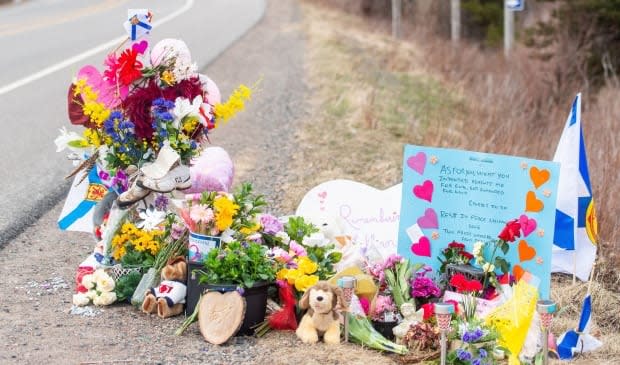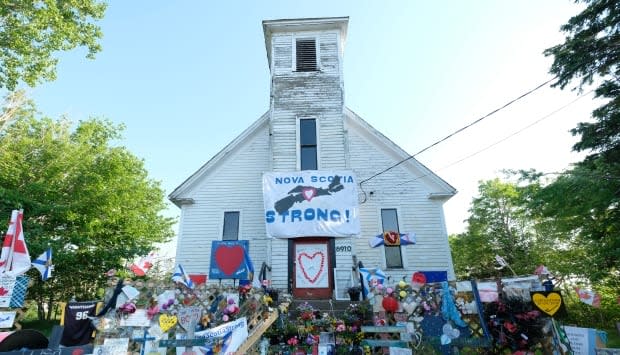Commission examining N.S. mass killing announces inquiry participants

The commission charged with investigating the mass killing in Nova Scotia in April 2020 has announced who has been approved to participate in the proceedings.
The inquiry will probe the circumstances that led to the shootings on April 18 and 19, 2020, when Gabriel Wortman disguised himself as an RCMP officer and killed 22 people over a span of 13 hours.
The inquiry will look at how police and various federal and provincial agencies responded, and how victims, their families and citizens were informed and supported.
It will also examine issues such as gender-based violence, access to firearms, the disposal of surplus police equipment, the shooter's previous interactions with police, other police actions, communications with the public and between police forces, and police policies and training.
In March, the commission invited people and organizations with a "substantial and direct interest" to apply to participate.
"The April 2020 mass casualty visited unthinkable pain upon the families of those who were killed and their communities," the commission said in the decision document released Thursday.
"It sent shock waves throughout the Province of Nova Scotia that reverberated throughout our entire country. The sheer magnitude of its repercussions prompts us to interpret 'substantial and direct interest' broadly so that we may hear as many affected and interested voices as possible."

All of the families of the victims except for that of RCMP Const. Heidi Stevenson, who was killed by Wortman in the final hours of the rampage, have asked to participate.
The shooter's common-law spouse, Lisa Banfield, also applied to be a part of the process. Banfield has been charged with providing the gunman with some of the ammunition he used during the rampage, although police say she didn't know what he was planning.
The commission received more than 60 applications for participation. Forms of participation may include testifying under oath, participating in roundtable discussions, providing expert reports or opinion evidence.
The federal and provincial governments have already been invited to participate. The RCMP is included in the federal government's participation rights.
Families and those most affected
Those most affected by the killings, including family members of victims, are also welcomed to participate in the investigation.
The following people have been accepted under that category:
Bagley family
Beaton family
Blair family
Bond family
Campbell family
Ellison family
Goulet family
Gulenchyn/Madsen family
Jenkins family
McCully family
McLeod family
O'Brien family
Oliver/Tuck family
Thomas/Zahl family
Webber family
Lisa Banfield
Beverly Beaton
Mallory Colpitts
Darrell Currie
Adam Fisher
Carole Fisher
Leon Joudrey
Tara Long
Andrew MacDonald
Greg Muise
Bernie Murphy
Deb Thibeault
Eleven other people applied, but the commission said it requires more information from them before it can make a decision about their participation.
The following organizations have been accepted as participants:
Victim advocacy organizations
Canadian Resource Centre for Victims of Crime (CRCVC)
Canadian Association of Chiefs of Police - National Working Group Supporting Victims of Terrorism and Mass Violence (CACP NWG)
Office of the Federal Ombudsman for Victims of Crime (OFOVC)
Health-related organizations
Nova Scotia Nurses Union (NSNU)
Nova Scotia Government and General Employees Union (NSGEU)
Along the Shore Health Board (ATSHB)
Firearm organizations
Canadian Coalition for Gun Control (CCGC)
Canadian Coalition for Firearms Rights (CCFR)
Justice organizations
BC Civil Liberties Association (BCCLA)
East Coast Prison Justice Society (ECPJS)
Nova Scotia Legal Aid (NSLA)
Gender-based organizations
Women's Legal Education and Action Fund (LEAF)
Avalon Sexual Assault Centre
Wellness Within
Feminists Fighting Femicide
Persons Against Non-State Torture
Women's Shelters Canada
Transition House Association of Nova Scotia
Be the Peace Institute
Elizabeth Fry Society of Mainland Nova Scotia
Police-related organizations
Atlantic Police Association (APA)
Canadian Police Association (CPA)
National Police Federation (NPF)
Nova Scotia Chiefs of Police Association (NSCPA)
RCMP Veterans Association of Nova Scotia (RCMP-VANS)
Truro Police Service (TPS)
Shedding light on domestic violence
Emma Halpern, the executive director of the Elizabeth Fry Society of Mainland Nova Scotia, said her group was troubled that Banfield, who was abused by the shooter, was criminalized in the aftermath of the killings.
Halpern said she hopes to help the commission understand the experience of domestic violence, the criminalization of victims and how the criminal justice system affects women.
She's also hoping governments will come up with the money and have the will to implement recommendations from the commission.
"That is where I think we have fallen short in prior commissions, is we haven't done the work to properly fund and resource what's needed to make the changes following the recommendations. And that's what really needs to happen if we're going to see change."
Concern about further gun regulations
Rod Giltaca, the CEO and executive director of the Canadian Coalition for Firearm Rights, said he wanted to participate in the commission's proceedings to provide information about the "divisive" issue of private firearm ownership in Canada.
"Our concern is that anti-gun groups in Canada, they disseminate a lot of disinformation based on their ideological pursuits, and accurate information and unbiased information is absolutely essential if we're going to take seriously the idea of figuring out what happened in Nova Scotia and how it could be prevented, if it could," he said.
Giltaca said he's concerned the mass killings in Nova Scotia could spark "ineffective, discriminatory further regulation" of firearms.
Wortman did not have a firearms licence and obtained the guns he used in the rampage illegally.
But Giltaca said that's not the key issue.
"Where an individual like this procured his firearms is far … less important than the mechanism that allowed him to carry out this rampage — the most significant one being the fact that he was dressed as an RCMP officer and drove a replica cruiser that allowed him to move virtually unimpeded throughout the entire area, doing whatever he wanted," he said.
In a statement, the National Police Federation said it's pleased to take part in the inquiry.
"Properly executed, the Commission will determine what happened and, most importantly, what factors led to this tragic event," said president Brian Sauvé. "Only then can we collectively and meaningfully address what needs to be fixed and begin to move from hurt to healing."
The commission's final report is due in November 2022.
MORE TOP STORIES

 Yahoo Movies
Yahoo Movies 